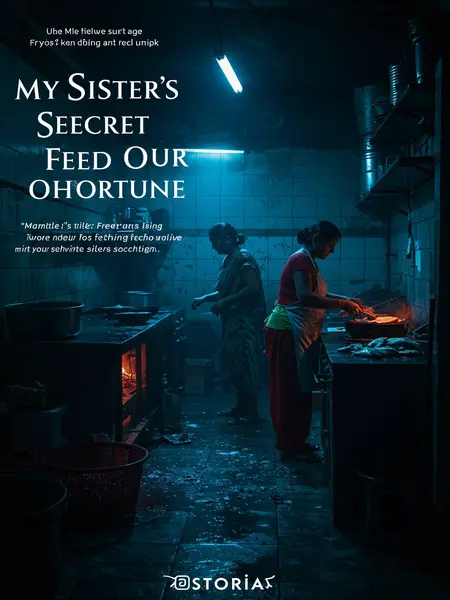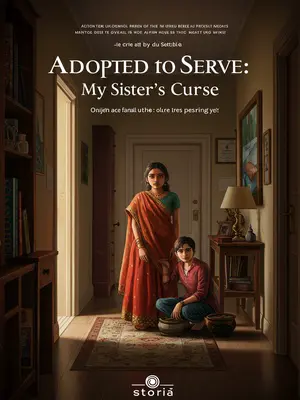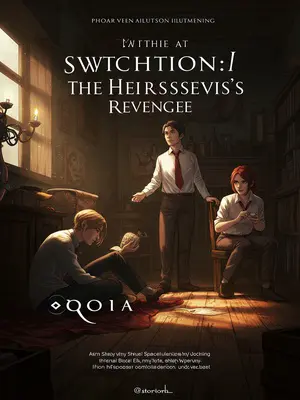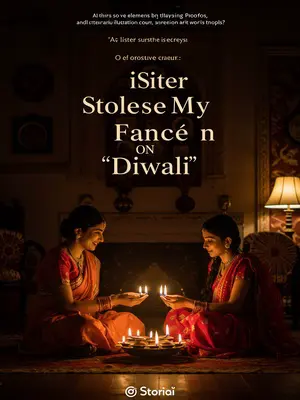Chapter 2: Pomfret Day Mysteries
My first day helping at the shop happened to be the first of the month—pomfret day.
Even before sunrise, Ma was up, lighting incense and putting a red tika at the entrance. Dad checked the pressure cooker, humming an old folk song. The city’s horns hadn’t even started yet, but our lane was full of people already.
I got up extra early, and when I arrived at the shop, there was already a long line outside.
Some customers had brought folding chairs, thermoses of chai, and were playing cards to pass the time. One uncle had brought his newspaper and a transistor radio, volume low. The air was thick with expectation—and the scent of raw fish and spices.
After opening the doors and letting customers in, I handed out number tags in order and told them pomfret would be served later. Some were already getting impatient.
One man kept tapping his foot, muttering about his blood sugar. Another asked if he could pay extra for an early plate. When I said no, he just grinned and said, “Beta, I was only testing your honesty.”
“What’s the point of getting up early to line up here? Bhaiya, all these Insta-famous restaurants are just hype—the food’s never as good as they say.”
A young man slumped over the table, grumbling.
He looked like a student from the engineering college nearby—messy hair, t-shirt with ‘IIT Prep’ faded on the back. His friend nudged him, rolling his eyes.
The middle-aged man with him gave a knowing smile:
“Just wait till you taste it. The pomfret here is something else—one bite and you’ll feel like a king. You can’t get this anywhere else.”
He said it like he was sharing a family secret. His accent had the rough edge of Kolhapur, but his eyes shone with pride. He patted the younger man’s back, as if initiating him into a sacred brotherhood.
The young man was skeptical: “Is it really that good? Are you sure you haven’t been cheated?”
He spoke in half-Marathi, half-Hindi, eyeing the menu suspiciously. “My cousin in Mumbai says nothing beats Mahim fish. This is just gaon ka stuff, no?”
An old uncle at the next table chimed in:
“Beta, you’ll know when you try it. The pomfret here is a real tonic. I’m over sixty, and after eating it, my wife and I found new joy.”
Everyone burst out laughing. The old uncle winked. Another man muttered, “Arrey wah, uncle, you should bottle that recipe!” Someone clapped, and the tension broke. For a moment, it felt like a family function.
There was a cheeky grin on his wrinkled face, but the diners around him just grinned knowingly and nodded.
One man gave a dramatic sigh, saying, “After eating here, my joint pain disappeared!” The others chuckled, but no one doubted the uncle’s claims. The whole place was alive with laughter and anticipation.
I grew even more puzzled, and just as I was about to ask, my parents came in carrying a foam box.
Dad held it like a treasure chest, Ma steadying him. The smell hit me first—strong, rich, salty. The entire room went silent for a second, as if a VIP had entered. The regulars straightened their shirts, grinning in expectation.
“The pomfret’s here, everyone can order in turn.”
Dad spoke with authority. He placed the box on the counter, and Ma placed a garlanded coconut beside it, almost like starting a puja. People jostled forward, money in hand, eyes shining.
The nearby diners all looked eager: “What else is there to order? Two pomfrets each, of course!”
Someone offered to pay double for a third, but Dad shook his head, smiling. “No black-marketing here, bhai.” The others groaned good-naturedly.
“Exactly—hurry up and cook! We’ve waited half a month just for this!”
Someone banged the table, and another started humming a Bollywood tune about fish curry. The whole scene was so typically Indian—impatience mixed with humour and drama.
“All right, coming right up!”
Ma clapped her hands, and the kitchen team—just us family—went to work. The sizzle of hot oil drowned out the city’s noise for a while.
My parents carried the box into the kitchen and called me to help.
Dad handed me an apron, looking serious for once. “Don’t tell your friends how we clean the fish. Let them think it’s magic.” Ma handed me a bowl of masala, the aroma making my eyes water, while an old transistor radio played Lata Mangeshkar in the background.
“Why isn’t your Didi here today?”
I asked, noticing her absence. Usually, she helped with cutting onions, humming old film songs.
Dad’s expression didn’t change. He waved it off: “She has her own things to do. Why are you asking so many questions?”
He sounded almost annoyed, but Ma gave me a quick glance, shaking her head. I decided not to push.
I could only get to work, but inside, I was muttering—today’s the busiest day, but my sister didn’t show up. That’s not like Dad, who never lets anyone slack off.
I checked the kitchen clock, wondering if Rupa was all right. I remembered how she used to be the fastest at scaling fish, her hands sure and quick. Today, the kitchen felt emptier without her laughter.
Before long, all the pomfret was sold out, but customers kept pouring in.
A chaiwala set up his thermos at the entrance, selling cutting chai to the waiting crowd, while a group of kids darted between the legs of customers, giggling. One man tried to bribe me for just one more, but I had to refuse. Ma made sweet chai for the disappointed customers, promising more next time. Dad wiped his brow, looking proud.
The young man who’d been complaining earlier now licked the masala off his plate, shouting that two pomfrets weren’t nearly enough.
He looked sheepish now, cheeks flushed, and kept asking his friend, “How did they make it taste like that?” A couple of customers clapped him on the back, saying, “Beta, now you know!”
“Hurry home and get more pomfret!”
Dad pressed the keys into my hand, “Jaldi ja, beta! People are waiting.” Even Ma nodded, urging me to be quick.
I agreed and rushed home on my scooty.
The roads were already buzzing, but I weaved through the traffic, heart pounding. I remembered Rupa’s flushed face from earlier and felt uneasy. The air felt thicker somehow, as if something important was about to happen.
The door was locked from the inside. I knocked for a long time before my sister slowly opened it.
I could hear the TV in the background, some saas-bahu serial playing. The air was heavy with humidity and the scent of agarbatti. Rupa opened the door just enough for me to see her face.
Her face was flushed, sweat soaking her forehead, and she was panting for breath. Her skin looked clammy, her eyes glassy with exhaustion.
Her hair stuck to her cheeks, and her kurti was damp around the collar. She clutched the doorframe, as if she’d just run a marathon. I reached out instinctively, but she flinched away.
“Didi, what’s wrong?”
I felt a jolt of fear, imagining all sorts of illnesses. I tried to remember if we had any paracetamol at home, or if the chemist nearby was open.
“N-nothing, why are you back?”
She tried to smile, but her lips trembled. The way she avoided my gaze made me even more worried.
“Mom and Dad asked me to get more pomfret.”
I tried to keep my voice light, but it sounded awkward. I glanced past her into the flat, noticing the curtains drawn tight and the smell—sharp, almost metallic.
Her face grew even paler. “I really don’t feel well. Can’t we just sell a little less?”
She leaned against the wall, looking smaller than ever. I remembered how she used to scold me for skipping breakfast. Now, she looked like she hadn’t eaten in days.
I was completely at a loss: “Should I take you to the hospital first?”
I reached for my phone, fingers trembling. I imagined calling an ambulance, the neighbours gathering in the corridor, and Dad shouting at me for making a scene.
She glared at me: “Honestly, you… Never mind. Just wait—I’ll bring it out in a minute.”
Her tone softened at the end, almost pleading. She turned and disappeared into the bedroom, leaving me standing there, heart racing.
With that, she turned and went into the bedroom.
I heard the door lock softly, then the volume of the TV increased, as if to cover any other sounds. I sat down on the sofa, nervously tapping my foot.
Not long after, strange moans and heavy panting drifted from the bedroom.
The sounds made my skin crawl. I felt embarrassed, ashamed, and scared all at once. I tried to distract myself by scrolling through Instagram, but my hand shook so badly I couldn’t focus.













